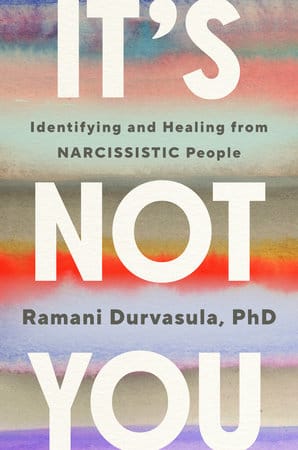Are You Dealing With a Narcissist This Holiday Season? Open Field Author and Narcissism Expert Dr. Ramani Durvasula Has the Exact Advice You Need
It was a combination of several things that led Dr. Ramani Durvasula—widely known as Dr. Ramani—to focus on narcissistic personality styles. As a research academic, she noticed the effect narcissistic patients had on nurses and physicians. "My field staff was complaining about the conduct of these patients who all seemed to have this same antagonistic personality style," she tells The Sunday Paper. Then, when she opened her private practice, Dr. Ramani saw more people struggling with narcissistic partners or family members. "I started educating them on these personality styles," she adds. "For most of them, it was a game changer."
That's when it "dawned" on her: Tons of research focuses on dissecting narcissism and similar antagonistic personality styles, but there's little regard for how people impacted by such personalities fare. "I was shocked," says Dr. Ramani, adding that she's personally had the wind taken out of her from narcissists.
In her forthcoming book (from Maria Shriver's publishing imprint The Open Field), It's Not You: Identifying and Healing from Narcissistic People, Dr. Ramani refocuses the light. She shows us that it's possible to thrive and heal during or after a relationship with a narcissist.
We'll dig deeper with Dr. Ramani in February 2024 when her book is released. Until then, we chatted with her this past week about the immediate: dealing with narcissists over the holidays. Here, she walks us through how to cope and thrive during this charged time.
What Is a Narcissistic Personality?
"I define narcissism as a personality style, not as a personal disorder," says Dr. Ramani, who says there are a range of patterns and traits that characterize this style. These include a lack of genuine empathy and variable empathy, entitlement, grandiosity, arrogance, selfishness, superficiality, admiration and validation-seeking, vanity, envy of other people, or believing other people envy them.
If someone has this personality style, they will often show up as manipulative, hostile, controlling, exploitative, and jealous, she says. They don't take responsibility, shift blame onto others, and set the relationship up as a place to serve themselves. "All of this, interestingly, is coding a very deep sense of insecurity and shame,” she adds. “Internally, the narcissistic person is very wounded.”
Narcissism and the Holidays: All the Feelings
This time of year, grief is the prevailing emotion for people who've experienced narcissistic or narcissistic adjacent relationships, Dr. Ramani tells us. That is because the holidays are filled with expectations and narratives that are often not the reality. "We want it to look a certain way, where everyone's getting along. It's a vision we have been sold."
There is also a feeling of being infantile or less than. For many, as soon as you walk through the door of a parent, sibling, or another family member's home, you're back to being the kid who never felt good enough—even if you're happy and prosperous in your adult life, says Dr. Ramani. "It's a very common response when we go back to hometowns, or we go back to be with a critical mass of people that may have invalidated us."
The grief comes from thinking or wanting this time or this person to be different, she continues. I want this to be a happy gathering. I want to feel connected. I want them to be different. Yet the truth is a person with a narcissistic personality will not change. "There's such a complex set of emotions that hit people, almost at an existential level," adds Dr. Ramani, who says the reality is quite stark. "You're still facing the critics who say, 'You still haven't bought a house yet? 'Why couldn't you make that marriage work?' 'Did you put on a little weight?' It all becomes painful and difficult."
Navigating Family Gatherings: Where to Start
When heading to a holiday gathering, Dr. Ramani says there’s something more important to bring than a side dish. "I always tell people you must bring realistic expectations," she says, explaining again that narcissists don't change. "If it's the same cast of characters, and some key narcissistic folks are in place, it will be the same this year."
So, lean into the truth, first and foremost. Then Dr. Ramani says to encourage yourself before you enter the situation. How? Her answer is simple: Prepare. "If they're coming to your house, prepare before they come that morning with meditation, exercise, reading, breathing—anything that uplifts you," she says, adding that you can do the same if you're traveling to someone's home. Listen to joyful or meditative music, sit in the car for a few minutes before entering, and take deep breaths. "It is getting yourself more into your body and not diluting yourself," she adds. "It's almost like you're going into an exam: If you don’t study, it will not go well. You prepare for an exam, so this, too, calls for preparation."
Practicing Radical Acceptance
Narcissistic personalities do not change. But what can change is how you approach them and the situation—because their digs will likely keep coming. This is where radical acceptance and kindness come into play. "Radical acceptance that narcissistic people are not going to change doesn't mean you still don't feel something," adds Dr. Ramani, clarifying that it is possible to accept that they won't change and still feel bad or sad that they won't. "But the difference is when you radically accept, you no longer feel like you can change this or them."
Accepting the truth sheds light on the critical fact that this is not about you. "They're baiting you. They're doing what they usually do. They're holding the power in the gathering, and they're seeking validation," she adds. "This has nothing to do with you. You're caught in the storm."
Narcissism Bingo and Other Coping Techniques
When you're caught in the "storm," as Dr. Ramani says, there are tactics to keep you from getting soaked. For starters, have some neutral, impersonal conversation topics ready. This could be anything from talking about the weather to the status of fixing the freeway. "Whatever it is, make sure it’s neutral and not emotionally laden."
Secondly, don't take their bait. Disengage from a conversation or don't feel like you must explain yourself or justify your life if they throw a dig your way, says Dr. Ramani. Step away, go for a walk, get some space. "Engaging with them will always end up with you being gaslighted, manipulated, or devalued, and it's not worth it."
If you need a more concrete practice, try this game Dr. Ramani suggests: Narcissism bingo. Say you're at a holiday gathering where there is a narcissist in your company. Once you've hit five toxic comments directed at you, give yourself a break and walk away momentarily. "Not in a dramatic way, and don't scream bingo, but just take a moment," says Dr. Ramani. These little breaks can even come in treating yourself to a gift or a massage. "After you've hit five of these comments, you're starting to wear out a little bit. So it might very well be that you sort of say, ‘Okay, I have to get out. I'm not going to do this much longer.’ You're setting guardrails."
It Ain't Over Yet: After the Holidays
If you think you're going to go home and "hit the ground running" after sharing a dinner, a few nights, or more with a narcissistic personality, think again, says Dr. Ramani. "Your psyche has been through something." What's important is to get back into your body by doing caring things that restore you. This could mean taking a nap, walking, playing with your pets, talking to a friend, writing in your journal, reading, or watching something funny. "You have to go into something where you soothe yourself," she adds.
A Happy Reminder
Dealing with narcissistic personalities is hard. Dr. Ramani dedicated an entire book to this (again, more on that early next year!). But it does not have to cloud your holidays (or life). There is endless joy to be had. Focus on the relationships and people you'll see who make you feel great, suggests Dr. Ramani. Even if there is a toxic sibling, parent, or in-law at your holiday gathering, don't forget "you're going to see a beloved aunt or someone else," she says. "Find that time to seek that person out. Focus on that part of the visit."

Dr. Ramani Durvasula is a licensed clinical psychologist and the Founder and CEO of LUNA Education, Training & Consulting. She is the author of several books, including the forthcoming It's Not You: Identifying and Healing from Narcissistic People. You can find her on her wildly popular YouTube and Instagram platforms, where she discusses narcissism, and you can listen to her on her podcast, Navigating Narcissism with Dr. Ramani. Learn more at doctor-ramani.com.




